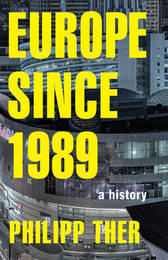
|
Europe since 1989: A History
Hardback
Main Details
| Title |
Europe since 1989: A History
|
| Authors and Contributors |
By (author) Philipp Ther
|
|
Translated by Charlotte Hughes-Kreutzmuller
|
| Physical Properties |
| Format:Hardback | | Pages:440 | | Dimensions(mm): Height 216,Width 140 |
|
| ISBN/Barcode |
9780691167374
|
| Classifications | Dewey:940.559 |
|---|
| Audience | | General | | Tertiary Education (US: College) | | Professional & Vocational | |
|---|
| Illustrations |
3 Maps
|
|
Publishing Details |
| Publisher |
Princeton University Press
|
| Imprint |
Princeton University Press
|
| Publication Date |
20 September 2016 |
| Publication Country |
United States
|
Description
The year 1989 brought the fall of the Berlin Wall and the collapse of communism in Eastern Europe. It was also the year that the economic theories of Reagan, Thatcher, and the Chicago School achieved global dominance. And it was these neoliberal ideas that largely determined the course of the political, economic, and social changes that transformed Europe--both east and west--over the next quarter century. This award-winning book provides the first comprehensive history of post-1989 Europe. Philipp Ther--a firsthand witness to many of the transformations, from Czechoslovakia during the Velvet Revolution to postcommunist Poland and Ukraine--offers a sweeping narrative filled with vivid details and memorable stories. He describes how liberalization, deregulation, and privatization had catastrophic effects on former Soviet Bloc countries. He refutes the idea that this economic "shock therapy" was the basis of later growth, arguing that human capital and the "transformation from below" determined economic success or failure. Most important, he shows how the capitalist West's effort to reshape Eastern Europe in its own likeness ended up reshaping Western Europe as well, in part by accelerating the pace and scope of neoliberal reforms in the West, particularly in reunified Germany. Finally, bringing the story up to the present, Ther compares events in Eastern and Southern Europe leading up to and following the 2008-9 global financial crisis. A compelling and often-surprising account of how the new order of the New Europe was wrought from the chaotic aftermath of the Cold War, this is essential reading for understanding Europe today.
Author Biography
Philipp Ther is professor of Central European history at the University of Vienna. His books include The Dark Side of Nation-States: Ethnic Cleansing in Modern Europe and Center Stage: Operatic Culture and Nation Building in Nineteenth-Century Central Europe. He lives in Vienna.
Reviews"His central thesis demands serious consideration. He argues that a 'neoliberal train,' put on track in Margaret Thatcher's Britain and Ronald Reagan's United States, began 'to cross Europe in 1989.' He says he uses neoliberalism 'as a neutral, analytical term,' and rightly distinguishes between its intellectual history and the specific social and political circumstances of its implementation."--Timothy Garton Ash, New York Review of Books "Eye-opening."--Frankfurter Allegemeine Zeitung "Groundbreaking ... and beautifully written."--Die Zeit "Bound to become the standard work for Europe's transformation since 1989."--Frank Bosch, H-Net "Recommended, not just the usual and interesting to see 'the West' treated as the periphery. Makes you wonder if eastern Europe ever had a chance."--Tyler Cowen, Marginal Revolution "A very sobering read."--Yuval Levin, National Review "[Europe since 1989] ... is well-documented. It can be recommended to general readers and students of postcommunist history in Europe."--Choice
|